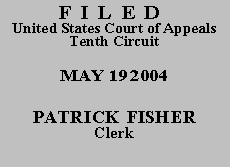

| THOMAS CHALK,
Plaintiff-Appellee, v. COMPUWARE CORPORATION, Defendant-Appellant. |
|
Only Mr. Chalk's breach-of-contract claim was submitted to the jury. On July 10, 2002, the jury found by a special verdict form that the Plan was a contract, that Compuware did not retain discretion over bonuses, and that Mr. Chalk was entitled to $240,000 in damages. Compuware filed a post-verdict motion for JMOL. On February 10, 2003, the court rejected Compuware's motion, and granted Mr. Chalk's motion for entry of judgment. This appeal followed. It "ultimately concerns two general arguments: (1) that the District Court erred in submitting . . . Chalk's . . . breach of contract claim to the jury; and (2) that the District Court erred in entering judgment . . . in light of an absence of evidence in support of the jury's award." Aplt. Reply Br. at 1.
We review de novo the district court's denial of Compuware's post-verdict motion for JMOL. Veile v. Martinson, 258 F.3d 1180, 1188 (10th Cir. 2001). In so doing, "we do not weigh the evidence, evaluate the credibility of witnesses, or substitute our conclusions for those of the jury." Abuan v. Level 3 Communications, Inc., 353 F.3d 1158, 1168 (10th Cir. 2003). Our review of the jury verdict "is limited to determining whether the recordviewed in the light most favorable to the prevailing party [Mr. Chalk,]contains substantial evidence to support the jury's decision." United Int'l Holdings, Inc. v. Wharf Holdings Ltd., 210 F.3d 1207, 1227 (10th Cir. 2000) (quotation omitted), aff'd, 532 U.S. 588 (2001).
Having reviewed the briefs, the record, and applicable law in light of the above-mentioned standards, we conclude that the district court correctly denied Compuware's post-verdict motion for JMOL, and did not err in holding that the record contains substantial evidence to support the jury's decision. We therefore AFFIRM the district court's February 14, 2003 judgment for substantially the same reasons as stated in its order dated February 10, 2003.
Entered for the Court
Circuit Judge
*. After examining the briefs and appellate record, this panel has determined unanimously that oral argument would not materially assist the determination of this appeal. See Fed. R. App. P. 34(a)(2); 10th Cir. R. 34.1(G). The case is therefore ordered submitted without oral argument. This order and judgment is not binding precedent, except under the doctrines of law of the case, res judicata, and collateral estoppel. The court generally disfavors the citation of orders and judgments; nevertheless, an order and judgment may be cited under the terms and conditions of 10th Cir. R. 36.3.